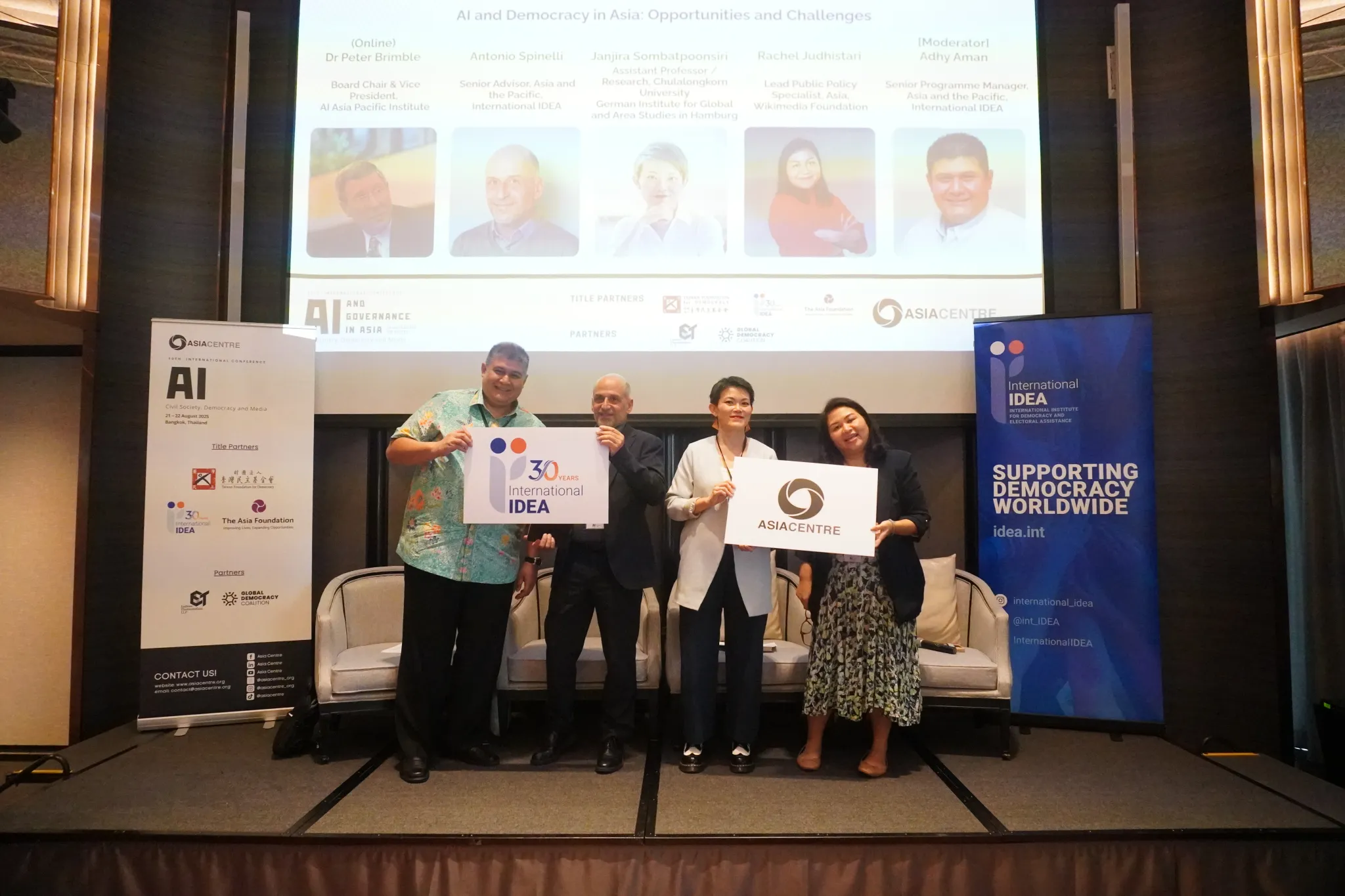Democracy in the age of AI: Towards ethical and inclusive electoral governance

The rise of generative artificial intelligence (AI) throughout the world is raising critical questions about how the technology will impact all aspects of society—from media, art, economics and law. Within the intersection of AI and elections, however, sits a space to confront how the new tools already are, and will in the future, shape elections and democratic institutions.
On the first panel at the Asia Centre’s 10th International Conference in Bangkok on 21 August 2025, convened around the topic, “AI and Governance in Asia”, the panel—hosted by International IDEA—dug into questions surrounding the ethical use of AI tools, the risks and opportunities for elections and electoral inclusion, and the risks of large-scale adoption of AI by governments and CSOs.
In her opening remarks, International IDEA’s Asia and the Pacific Regional Director Leena Rikkilä Tamang made a call to electoral management bodies across the region, stating, “There is an urgent need for preparedness to ensure elections remain free, fair, and secure.” She added that EMBs must not only strategise to mitigate risks, but to harness its benefits.
Opening the discussion, moderator and senior programme manager from International IDEA, Adhy Aman, asked Peter Brindle, the Vice President of the AI Asia Pacific Institute, to set the scene and provide an overview of the actors, both malevolent and benevolent.
Describing AI as having an “enormous ability to strengthen institutions”, Brimble highlighted the growing deployment of AI by governments in Southeast Asia. Generative AI offers vast possibilities for enhancing citizen engagement, improving multilingual access to public services, and equipping civil society with tools to monitor sentiment and fact-check political discourse. Some governments, notably Singapore, have taken early steps to establish frameworks and principles for AI governance, which have shaped ASEAN’s own regional approaches. Thailand, meanwhile, is experimenting with new principles, though concerns remain that its direction departs from a rights-based framework.
Turning towards elections, senior advisor from International IDEA Antonio Spinelli sketched out the “dual sword” nature of AI in elections—that is—having both significant potential for both negative and positive impact but noted that the negative side is “much more destructive.”
“We have seen since the rise of ChatGPT in 2022, elections have become a major testing group for this emerging [technology]. In a very short time, AI has shifted from being an experimental novelty to be embedded in how information is shaped, received, and disseminated,” he said. Across Asia, AI has been misused to erode trust in electoral processes—through fake audio clips in India, sexualised deepfakes targeting women politicians in Bangladesh, and fabricated campaign videos in South Korea. Such tactics amplify polarisation, distort truth, and intimidate opponents. Actors, both inside and outside political parties, have been involved in these types of harmful campaigns.
For civil society, AI can provide a tool to reach more people, more quickly, and to mobile support. However, the imbalance of resources can hamstring their utilisation of the technology, according to Dr Janjira Sombatpoonsiri, Research Fellow at the German Institute for Global and Area Studies in Hamburg and an assistant professor at Institute of Asian Studies, Chulalongkorn University.
Civil society groups are often at a disadvantage compared to governments, she warned, given the imbalance in resources and institutional memory. State-backed influence operations in Thailand have millions in funding and access to behavioural data, creating an “integrated ecosystem of repression” that leaves activists vulnerable not only to digital manipulation but also to mental and emotional strain.
On the matter of regulation, Rachel Judhistari, Lead Public Policy Specialist, Asia, Wikimedia Foundation underscored the need to see AI not just as a commodity but as a public good, emphasising its role in preserving Indigenous languages and supporting inclusive governance. “AI is only a tool to make human-created products better and easier,” she argued, stressing that regulation must go beyond a business lens and centre on public interest,” she said. Echoing Judhistari, Abhisit Vejjajiva, 27th Prime Minister of Thailand called on ASEAN, as a bloc, to “counter the tech giants, as countries alone are too small,” he said.
Drawing the threads of the conversation together, panelists agreed that to leverage AI for stronger and more inclusive elections in Asia, there is an obvious need for clear ethical and transparency standards, independent oversight, and investment in tools to detect and counter disinformation. Embedding AI governance into electoral preparedness—through risk assessments, contingency planning, and regional cooperation—will be vital to safeguarding integrity. Equally important is building public digital literacy, particularly among vulnerable groups, while also leveraging AI for democratic innovation by supporting civic technologies that enhance transparency, accessibility, and voter engagement in a responsible and accountable way. Countries should take a regional approach in navigating AI governance towards “regional operability”, such as the ASEAN Guide on AI Governance and Ethics, and to obtain greater leverage in dealings with tech companies.
Such an approach would embody Pita Limjaroenrat’s vision for AI in Asia, outlined at the beginning of the conference, to act as an “equaliser, not an excluder.”
Additional reading: Artificial Intelligence for Electoral Management




